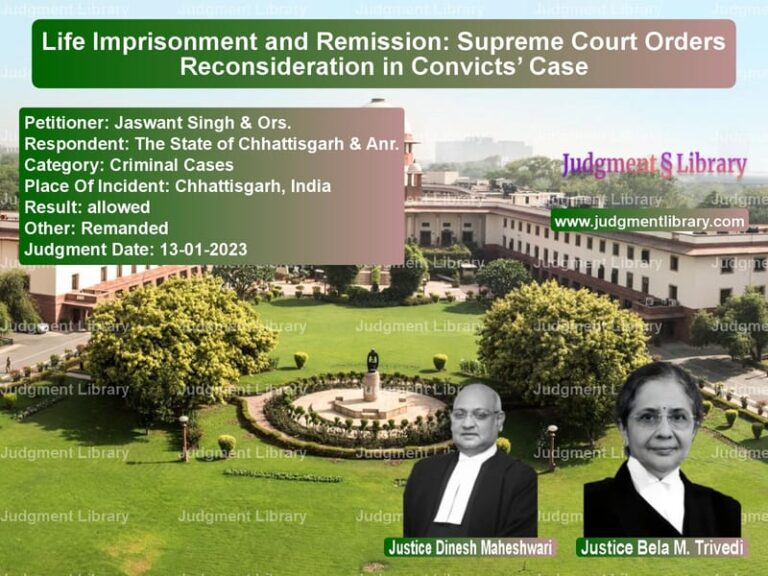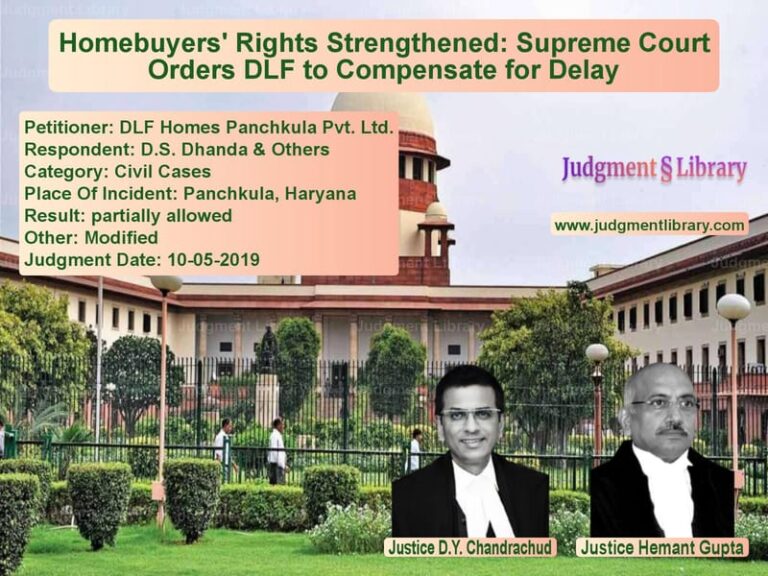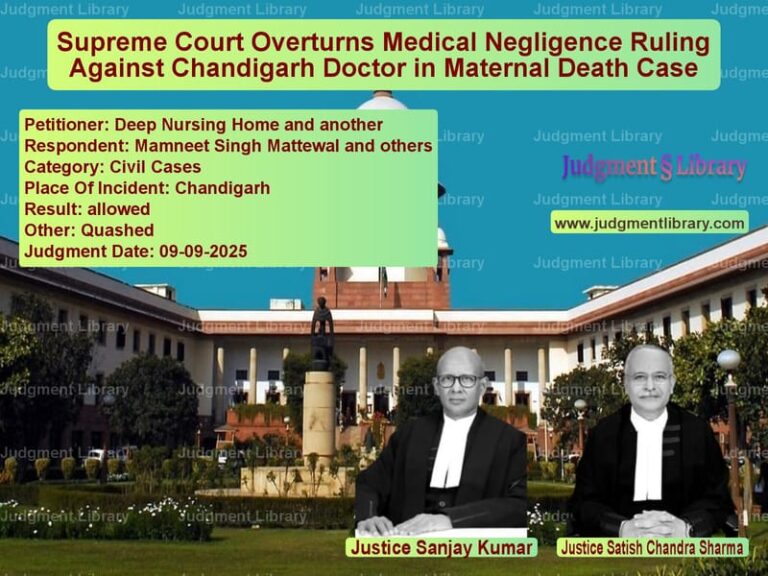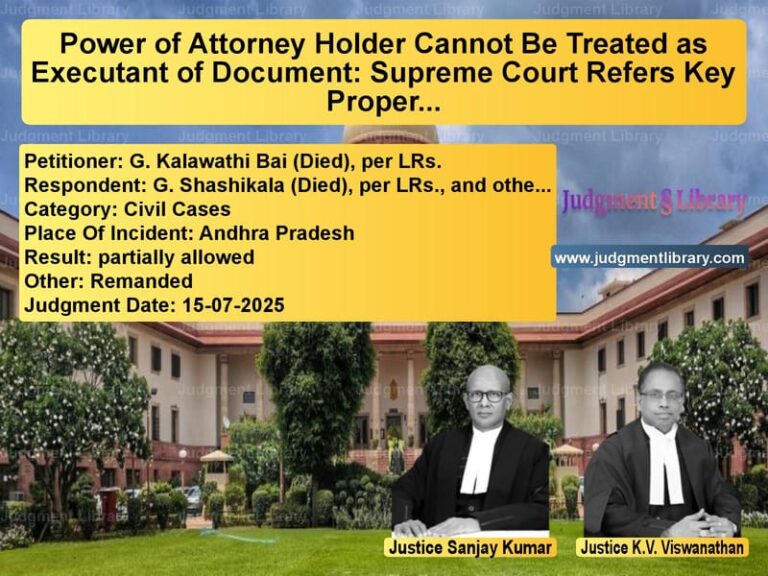Regulation of School Fees: Legal Battle Between Private Schools and the State Government
The case of Rustom Kerawalla Foundation vs. State of Maharashtra revolves around the regulation of school fees in private institutions and the role of the government in ensuring transparency and fairness. The Supreme Court of India was tasked with examining whether the State Government had the authority to regulate school fees under the Maharashtra Educational Institutions (Prohibition of Capitation Fee) Act, 1987, and whether the expenses claimed by the school, including rent for its building, were legitimate.
Background of the Case
Rustom Kerawalla Foundation, which operates Vibgyor High School in Mumbai, challenged the orders of the Deputy Director of Education, who disallowed expenses towards rent for the school building amounting to Rs. 2.5 crores per year. The school had prescribed a fee structure of Rs. 54,598 per year for the Primary Section and Rs. 61,149 for the Secondary Section from the year 2008-2009, which was approved by the education authorities.
Legal Framework: The Maharashtra Educational Institutions Act
The Maharashtra Educational Institutions (Prohibition of Capitation Fee) Act, 1987, prohibits educational institutions from collecting capitation fees for admission or promotion to a higher class. Section 4 of the Act empowers the State Government to regulate tuition fees and other charges collected by schools.
Key Provisions of the Act:
- Section 3: Prohibits the collection of capitation fees by any educational institution.
- Section 4: Empowers the government to regulate school fees.
- Section 6: Grants the government power to inspect financial records of schools.
- Section 7: Prescribes penalties for violating the Act, including imprisonment and fines.
Complaints Against the School
Parents of students studying at Vibgyor High School raised concerns regarding the increasing fees and alleged financial irregularities. They complained to the Education Minister, stating that the school was being run as a business and was engaging in profiteering.
Subsequently, the Deputy Director of Education ordered an audit of the school’s accounts. The audit revealed that the school had claimed excessive expenses, particularly rent for the school building, without providing sufficient documentation. As a result, the government disallowed the rent expenses and directed the school to refund the excess amount collected from students.
Arguments by the Petitioner
The counsel for Rustom Kerawalla Foundation, led by Dr. Abhishek Manu Singhvi and other senior advocates, argued:
- The power to regulate school fees under Section 4 of the Act rested with the State Government and could not be delegated to lower authorities.
- The Deputy Director of Education had exceeded his authority by disallowing rent expenses without proper justification.
- The school’s lease agreement was valid, and the rent paid was reasonable.
- Since the school was an unaided institution, it had the right to determine its own fees.
Arguments by the Respondents
The State Government and parents of the students countered these arguments, stating:
- The land on which the school was built was allotted by Maharashtra Housing and Area Development Authority (MHADA) at a concessional rate.
- The school had entered into a lease agreement with a private company owned by its own trustees, creating a conflict of interest.
- The payment of Rs. 2.5 crores per year as rent was artificially inflated to extract profits.
- The government had the right to regulate fees to prevent profiteering and ensure affordability.
Supreme Court Judgment
The Supreme Court upheld the government’s right to regulate school fees under the Act. The Court made the following key observations:
- Schools that receive public land or financial aid from the government must comply with fee regulations.
- The lease rent of Rs. 2.5 crores appeared excessive, and the school had failed to provide proper documentation justifying the amount.
- The trustees of the school and the directors of the company receiving the rent were the same individuals, raising concerns of financial mismanagement.
- The government had the authority to investigate and take corrective action to prevent the exploitation of students and parents.
The Court directed the State Government to review the school’s fee structure and take appropriate action. It also instructed the school to refund any excess amounts collected from students.
Conclusion
This judgment sets a precedent for private schools operating on public land or receiving indirect financial benefits from the government. It reaffirms the State’s authority to regulate school fees to prevent profiteering and ensure that education remains affordable for all. The ruling also highlights the need for transparency in financial dealings of educational institutions to protect students and parents from unjustified fee hikes.
Don’t miss out on the full details! Download the complete judgment in PDF format below and gain valuable insights instantly!
Download Judgment: Rustom Kerawalla Fou vs State of Maharashtra Supreme Court of India Judgment Dated 03-08-2017.pdf
Direct Downlaod Judgment: Direct downlaod this Judgment
See all petitions in Consumer Rights
See all petitions in Contract Disputes
See all petitions in Debt Recovery
See all petitions in Judgment by Adarsh Kumar Goel
See all petitions in Judgment by Uday Umesh Lalit
See all petitions in Remanded
See all petitions in Remanded
See all petitions in supreme court of India judgments August 2017
See all petitions in 2017 judgments
See all posts in Civil Cases Category
See all allowed petitions in Civil Cases Category
See all Dismissed petitions in Civil Cases Category
See all partially allowed petitions in Civil Cases Category







